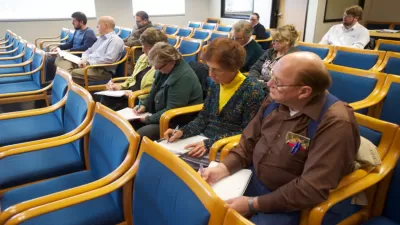A new study reveals the biases of the public planning process.

Tim Logan shares news of a new study from researchers at Boston University that analyzed "three years worth of meeting minutes from 97 cities and towns in the region, and found nearly two-thirds of residents who stood up to speak about proposed housing developments."
"The study also dug into who the commenters are, using a variety of public records to estimate age, voting history, and other factors, such as whether people own or rent their home," according to Logan.
That description of the study's methodology admittedly buries the lede on the finding of the study: People who speak at city council meetings on the subject of new development overwhelmingly oppose development. They also tend to be older, more affluent, white homeowners.
Katherine Levine Einstein, a BU political science professor and one of the study’s authors, is quoted in the article describing the disparities between the population that shows up for city council meetings: "These are crazy disparities….Far worse than disparities in voting demographics. Far worse than representation in Congress."
FULL STORY: BU researchers examine the NIMBY factor

Trump Administration Could Effectively End Housing Voucher Program
Federal officials are eyeing major cuts to the Section 8 program that helps millions of low-income households pay rent.

Planetizen Federal Action Tracker
A weekly monitor of how Trump’s orders and actions are impacting planners and planning in America.

Ken Jennings Launches Transit Web Series
The Jeopardy champ wants you to ride public transit.

Rebuilding Smarter: How LA County Is Guiding Fire-Ravaged Communities Toward Resilience
Los Angeles County is leading a coordinated effort to help fire-impacted communities rebuild with resilience by providing recovery resources, promoting fire-wise design, and aligning reconstruction with broader sustainability and climate goals.

When Borders Blur: Regional Collaboration in Action
As regional challenges outgrow city boundaries, “When Borders Blur” explores how cross-jurisdictional collaboration can drive smarter, more resilient urban planning, sharing real-world lessons from thriving partnerships across North America.

Philadelphia Is Expanding its Network of Roundabouts
Roundabouts are widely shown to decrease traffic speed, reduce congestion, and improve efficiency.
Urban Design for Planners 1: Software Tools
This six-course series explores essential urban design concepts using open source software and equips planners with the tools they need to participate fully in the urban design process.
Planning for Universal Design
Learn the tools for implementing Universal Design in planning regulations.
Ada County Highway District
Clanton & Associates, Inc.
Jessamine County Fiscal Court
Institute for Housing and Urban Development Studies (IHS)
City of Grandview
Harvard GSD Executive Education
Toledo-Lucas County Plan Commissions
Salt Lake City
NYU Wagner Graduate School of Public Service





























